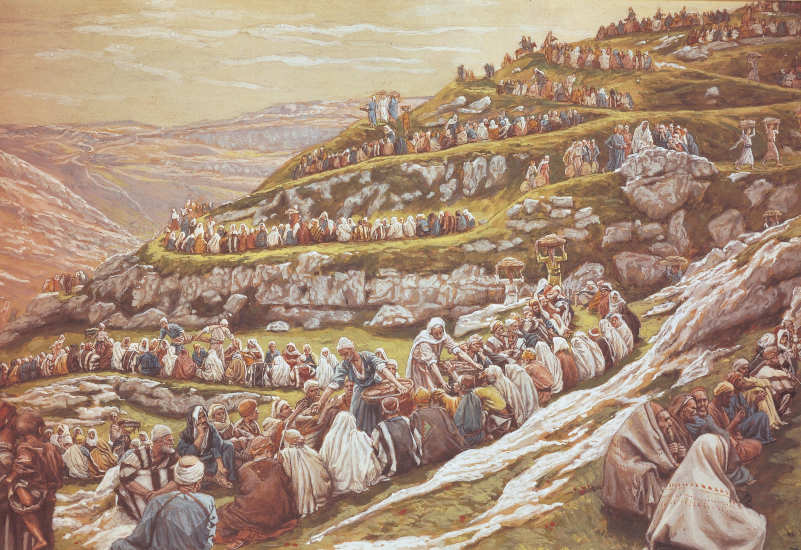
There once was a new, rather inexperienced Deacon, who was preaching a homily about the feeding of the 5000. Nervous, he mixed the numbers up, and told people that Jesus fed 5 people and gave them 5000 loaves of bread. A cranky parishioner right in front laughed at the blunder. “Better get your facts straight before preaching on that gospel again.” The next July the Deacon preached the same homily, but this time was more confident. With another stab at it, he said 5 loaves, two fish, and that Jesus fed 5000 people, all the while looking straight at cranky. The deacon added for emphasis, “It was quite a miracle.” Cranky muttered, “That was no miracle. There was still plenty of food left from the last time you told the story.”
We can learn a lot about who Jesus is from today’s gospel – a story considered so important that it is the only one of Jesus’ miracles recorded in all four gospels.
Can you imagine how the disciples must have felt when Jesus gave the instructions for the people to sit down? Maybe they felt like saying: “Healing the sick is one thing – but feeding 5000 men and several thousand women and children with five loaves and two fish is asking the impossible.” Did they feel that if Jesus failed to feed the crowds they would look like fools? Did they feel like saying to Jesus “Don’t be stupid.” The disciples had one view of the situation and Jesus had a different vision of the situation. The disciples were putting a limit in what to expect – Jesus had no limits. The disciples’ vision was small, but Jesus’ vision was limitless.
It hasn’t changed much since then. Our vision and expectations are often small, but Jesus’ vision and expectations for us are without limits. And if we try to expand our vision to be more like the vision of Jesus the world says to us “You are stupid.” The world says you are stupid if you want to do something about the more than one billion of the world’s eight billion people that are living on less than two dollars a day. You are stupid if you want to feed the chronically hungry also totally a staggering one billion – the highest number in human history.
And the world is right according to its own standards and vision, but the visions and standard of the western world are very often not the vision of Jesus. According to the mind of the world, following Jesus is irrational. So, to follow Jesus in our world you have to lose something. Maybe you have to lose some respect for yourself to follow Jesus now. When Mary said “yes” to the angel Gabriel, she lost respect for herself. In the eyes of the world, she was a loser, but in fact she became a winner. If we decide not to lose something for Jesus and follow the ways of the world, then we will end up losers in the end.
In today’s Gospel, Jesus is not the only one with a big vision. The other person with a big vision is the small boy who owned the bread and fish. The thinking of the world now is “What’s in it for me?” or “What will I get out of it?” That is the attitude that is destroying our western society. If that small boy had that attitude and did not give his five loaves and two fishes to Jesus, there would have been no miracle. Because of his generosity a great miracle took place. He shows us that when we give, we receive. The vision of the world is often small and narrow, but the vision of Jesus is without limits.
We can ask ourselves: What is our vision of ourselves and the world? Do we take our vision of ourselves from the world or from Jesus? The only way to see yourself is to see yourself as Jesus sees you.
The miracle of the multiplication of the loaves and fishes was preparing for an even greater miracle where Jesus would expand our vision even more. The multiplication of the loaves and fishes was preparing for the miracle of the Eucharist. To human eyes in the Eucharist, one sees bread and wine – or “a wafer” as news reports and our prime minister recently put it – but with the eyes of faith we can see the body and blood of Christ. Again, according to the world it is irrational, it is stupid to believe in transubstantiation – that the bread really changes into the body of Christ and the wine really changes into the blood of Christ. But following Jesus does not entail looking at Jesus with the eyes of the world. Following Jesus means looking at Jesus with the eyes of faith, with the faith of Mary who accepted the impossible from the Angel Gabriel and responded: “Let it be done to me according to your word.”
The crushing burden of poverty is scarcely imaginable to Canadians and the other G8 countries that recently met in Italy. In the poorest countries, life comes with no safety nets. Children drop out of school because they must work. The sick die because medicine is scarce or unaffordable. Mothers must make agonizing choices between the children they will feed.
Some critics argue that times are tough – but we might remember that the world’s financial leaders mobilized more than $10 trillion to prop up the global economic system. But what can each of us do? See ourselves as Jesus sees us. Take our vision of ourselves and our possibilities from Jesus. Miracles can still happen!
–Dcn. Terry Murphy

